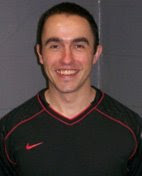On February 14th I spent a couple of hours in the company of a group of enthusiastic triathletes. This was the first sessi
 on in a 4 part seminar series looking at various aspects of strength and conditioning and how to improve performances without having to spend endless hours out on the bike, in the pool or pounding the streets.
on in a 4 part seminar series looking at various aspects of strength and conditioning and how to improve performances without having to spend endless hours out on the bike, in the pool or pounding the streets.During the first 2 hour session Itook the group through the underpinning theory and concepts of strength training before moving into the gym to put participants through their paces. The practical element really brought the theory to life and gave participants real world training techniques that they could go away with and start using straight away.

The icing on the cake was a group ride led by Phil Gray from Total Racing International Coaching. For more details of the remaining events visit the multisportlink website
I then had a 05:00 start on Tuesday to make sure I could hook up with Neil Parsley down in Manchester to start putting together our presentation on Total Training for Combat Sports which forms part of the Smart Fitness Functional Training Summit. I spent the morning with Neil at the English Institute of Sport in Manchester (a place I used to frequent often when I worked for the EIS!) and we spent the whole morning throwing ideas around. The end result is what I think in my humble opinion is going to be a superb presentation, between the two of us we have some great concepts and Neil can bring some 'behind the iron curtain' training techniques that have to be seen to be believed. I can't wait until April and I know we have a number of top ranked MMA athletes attending the seminar, so it will be great to see what they think and have to say about our presentation.
Needless to say, the guys in this clip have not influenced our training methodology!
The next day I met with a business group to discuss a forthcoming project that I'm helping develop with fellow strength coach Nick Ward. The project is still in the early stages and I don't want to give too much away but we think we have a pretty special product that we will be making available to a select group of executive business men and women in July. The Executive Athlete Performance (EAP) Programme is unlike anything else out there at the moment and it's going to be a great challenge to work with high performing business men and women and opening their eyes to the training processes used by elite atheltes which in turn will help boost their business performance.
On Thursday I had the pleasure of speaking to a group from Northumbria University about Smart Fitness. The topic was business related and I spent 2 hours with the group and discussed the reality of setting up a business and the challenges faced during a difficult economic period. It's not until you take time to reflect on what you have actually done during the past 18 months that you realise just how far you have come.

The final speaking engagement was yesterday where I spent the morning with a group of tennis coaches based in the North East. Smart Fitness have been providing strength and conditioning support for the regions up and coming tennis players since August 2008, and during discussions with the Academy Director (Chris Sanderson) we struck upon the idea of sharing their training principles with the regional coaches to help improve the overall development of players within the North East region.
This session was the first of several sessions to be run throughout 2009 and focused on how strength and conditioning can benefit young players. I explained how improvements in a players 'gross athleticism' will tranfer to improved performances on court and once the underlying theory had been covered the group moved through to the indoor tennis centre where myself and Joe Wear put the coaches through their paces, showing them exactly what we are looking for when it comes to developing strong and robust tennis players. The next session is scheduled for March 23rd and will focus on the development of multidimensional speed and agility for the young tennis player.
So it has been a pretty busy couple of weeks and whilst it is always great to meet and spread the word I still enjoy getting back onto the gym floor.

.jpg)

.bmp)



